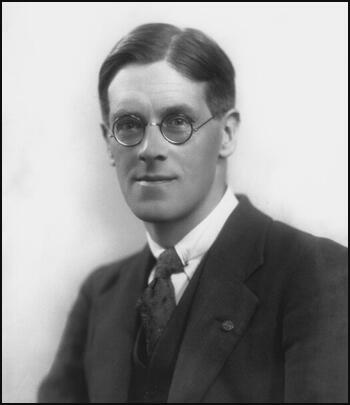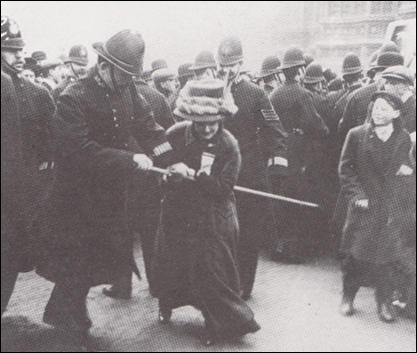Today's Written Primary Sources for the History Classroom
Activities for the History Classroom

(1) Fenner Brockway, Inside the Left (1942)
The supreme lesson which I learned from my study of criminology and penal methods was that the problem is inseparable from the problem of the social and economic system. The vast majority of those in prison are the victims of economic conditions, and when they leave they have little chance to obtain the security which would encourage them to turn their backs on the petty thefts and similar offences which take them to prison again and again. Most startling of all was the realisation that, intolerable as are the conditions in prison, many actually find them preferable to the hunger and the slum life which are their lot outside.
Question: Fenner Brockway was a conscientious objectors during the First World War. In 1916 he was sent to prison for publishing leaflets against conscription and refusing to join the armed forces. After he was released he was appointed as joint secretary with Stephen Hobhouse, of the Prison System Enquiry. Sydney Olivier was chairman and other members included George Bernard Shaw, Beatrice Webb, Sidney Webb and Margery Fry. The committee took evidence from over 400 witnesses, three hundred of whom were ex-prisoners and one hundred officials such as "warders, chaplains, medical officers, governors, prison magistrates, and officials of the discharged Prisoners Aid Societies."
The report English Prisons Today was published in January 1922. The accounts provided by prisoners caused a sensation. One prisoner serving his first sentence said: "This life reduces one to the level of a wild beast, and every bit of one's better self is literally torn out. If you come to meet me in August, look out for something between a man and a beast." Another man, who was in prison for a third time, wrote: I should like to see anyone make me tender. Why, this life has taken all the feeling out of me. Shall have neither compassion or pity on anyone for the future if they get in my way."
What does Fenner Brockway mean when he says: "The vast majority of those in prison are the victims of economic conditions."?

(2) Henria Williams, letter to Dr. Jessie Murray (27th December, 1910)
I should first mention that I have a weak heart, and have not the physical power or breath to resist as my wish or spirit would will or like. Therefore, what may not seem extraordinary to some women or people was very much so for me. The police have such strong, large hands, that when they take hold of one by the throat, as I saw one man do - but not to me - or grab one's sides or ribs, which was done to me, they cannot possibly know how terribly at times they are hurting.
One policeman after knocking me about for a considerable time, finally took hold of me with his great strong hand like iron just over my heart. He hurt me so much that at first I had not the voice power to tell him what he was doing. But I knew that unless I made a strong effort to do so he would kill me. So collecting all the power of my being, I commanded him to take his hand off my heart. Yet that policeman would not arrest me and he was the third or fourth who had knocked me about. The two first after pinching my arms, kicking my feet, and squeezing and hurting me in different ways, made me think that at last they had arrested me, but they each one only finally took me to the edge of the thick crowd, and then without mercy forced me into the midst of it, and with the crowd pushing in the opposite direction for a few minutes I doubted if I could keep my consciousness, and my breath had gone long before they finally left me in the crowd… Finally, I was so exhausted that I could not go out again with the last batch that same evening. Although I had no limbs broken, still my arms, sides, and ankles were sore for days afterwards. But that was not so bad as the inward shaking and exhaustion I felt.
One gentleman on the first day rescued me three times. After the third time, he said to the policeman, who happened to be the same one each time, "Are you going to arrest this lady, or are you going to kill her?" But he did not arrest me, but he actually left me alone for some time after that."
Question: Henria Williams died from her injuries on 2nd January 1911. Henry Brailsford was commissioned to write a report Treatment of the Women's Deputations of November 18th, 22nd and 23rd, 1910, by the Police (1910) on Black Friday. He took testimony from a large number of women, including Mary Frances Earl: "In the struggle the police were most brutal and indecent. They deliberately tore my undergarments, using the most foul language - such language as I could not repeat. They seized me by the hair and forced me up the steps on my knees, refusing to allow me to regain my footing... The police, I understand, were brought specially from Whitechapel."
Charles Mansell-Moullin, who had helped treat the wounded claimed that the police had used "organised bands of well-dressed roughs who charged backwards and forwards through the deputations like a football team without any attempt being made to stop them by the police."
Sylvia Pankhurst believed that Winston Churchill, the Home Secretary, had encouraged this show of force. "Never, in all the attempts which we have made to carry our deputations to the Prime Minister, have I seen so much bravery on the part of the women and so much violent brutality on the part of the policeman in uniform and some men in plain clothes. It was at the same time a gallant and a heart-breaking sight to see those little deputations battling against overwhelming odds, and then to see them torn asunder and scattered, bruised and battered, against the organized gangs of rowdies. Happily, there were many true-hearted men in the crowd who tried to help the women, and who raised their hats and cheered them as they fought. I found out during the evening that the picked men of the A Division, who had always hitherto been called out on such occasions, were this time only on duty close to the House of Commons and at the police station, and that those with whom the women chiefly came into contact had been especially brought in from the outlying districts. During our conflicts with the A Division they had gradually come to know us, and to understand our aims and objects, and for that reason, whilst obeying their orders, they came to treat the women, as far as possible, with courtesy and consideration. But these men with whom we had to deal on Friday were ignorant and ill-mannered, and of an entirely different type. They had nothing of the correct official manner, and were to be seen laughing and jeering at the women whom they maltreated."
Why did the Home Secretary change the way they dealt with women campaigning for the vote?

